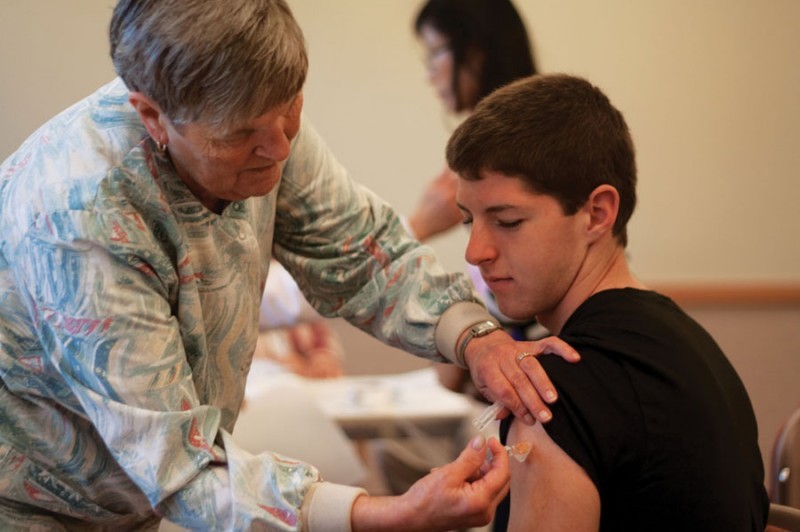Exercise, the flu and you: Working out might boost immune system’s response to vaccines
Photo: Kelsey Kremer/Iowa State
Perry Martens, freshman in mechanical engineering, gets a flu shot Thursday, Sept. 30 in the Union Drive Community Center. Thursday was the last day the Thielen Student Health Center was offering flu shots in the UDCC, but they will still be giving flu shots and mists on Wednesday and Saturday mornings thru October.
November 28, 2012
With the advent of the flu season rapidly approaching, exercise after flu vaccination could help give students more “bang to their buck” and increase their chances at resisting the debilitating illness.
Researchers in Iowa State’s department of kinesiology recently discovered a connection between exercise after vaccination and increased immune response. They now work toward finding the mechanisms that trigger the increase in the body’s immune response to vaccines.
Marian Kohut, professor of kinesiology, and her research team previously tested and gathered data on the connection between post-vaccination exercise and increased immune response through a series of studies.
The first study was tested on mice, which Kohut said showed a single session of exercise did have some benefits in terms of resistance to influenza virus infection. The second study, tested on humans, determined whether 90 minutes of exercise improved response to influenza vaccine.
“We observed that 90 minutes of exercise performed just after receiving the vaccine increased antibody response to the vaccine at two and four weeks post-immunization,” Kohut said.
The third and current study also tests mice with a model based on data gathered from the second study. Kohut said these studies will help researchers determine the mechanisms by which 90 minutes of exercise improves antibody response to influenza vaccine.
Justus Hallam, graduate research assistant in kinesiology and member of Kohut’s team, focuses his research on observing vaccination and the idea that a single session of exercise immediately after the vaccination could be beneficial.
“I am still trying to determine how much exercise is important as well as what the exact mechanism of this benefit is,” Hallam said. “I have recently begun to look at this in mice.”
Hallam said the most common way which researchers test an immune response to vaccine is by measuring an antibody titer. The titer measures the amount of antibody that has been produced in response to the vaccine, called an antibody titer.
“Antibodies are one of the body’s main defenses against a viral pathogen,” Hallam said. “The higher the antibody titer typically indicates a better response to the vaccine.”
Hallam said the next step in his research will be to look at the movement of the vaccine through the mouse’s body after exercise. This step will help researchers determine the mechanisms by which exercise helps activate to move the vaccine throughout the mice’s body.
The research being conducted in this current small pilot project is also being used to help develop exercise strategies for older adults. As older adults age, their immune systems weaken. An older adult’s antibody response to vaccines is not as strong the young adult. The antibody response in older adults could be strengthened by post-vaccination exercise.
Kohut said a previous study in older adults tested whether one year of moderate exercise training would improve antibody response after vaccination.
“We did find that moderate exercise training improved antibody response in older adults,” Kohut said. “If the improved antibody response after 90 minutes of exercise observed in young adults were also to be found in older adults, the older adults would be expected to be better protected from influenza infection.”
However, there is still work to be done and Kohut noted that she and her team have not yet tested this possibility with a large number of older adults. Other factors not yet fully addressed, which Kohut said will be included in future studies, are nutrition and psychosocial factors such as stress, depression or social support.
Unfortunately for students, the research currently being conducted is still in the preliminary stages, and Kohut said it is too early to give exact exercise recommendations. While students wait, Kohut and her research team will collect more data from tests that could be put into practice in the near future.
“This study will help to identify the host factors that are important in determining antibody response to vaccination,” Kohut said. “Once we know the mechanism that triggers the increased immunity, that might help us determine how much and what kind of exercise would elicit this immune response.”

















